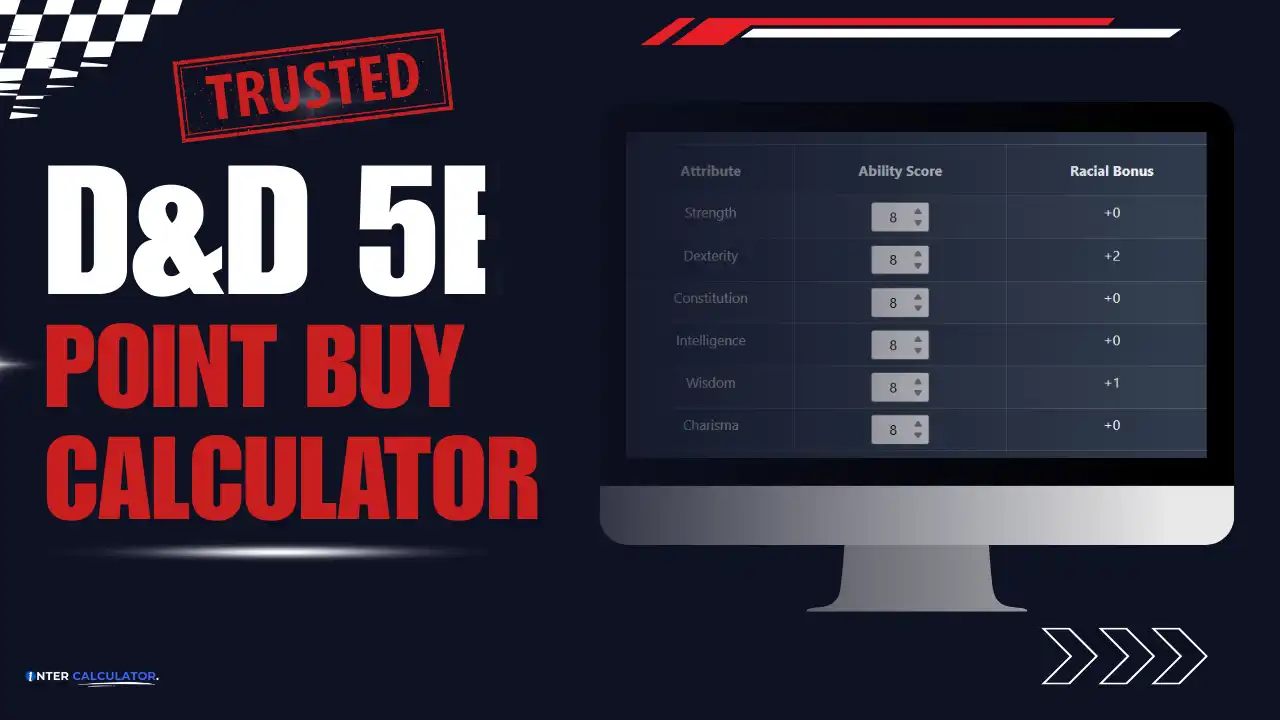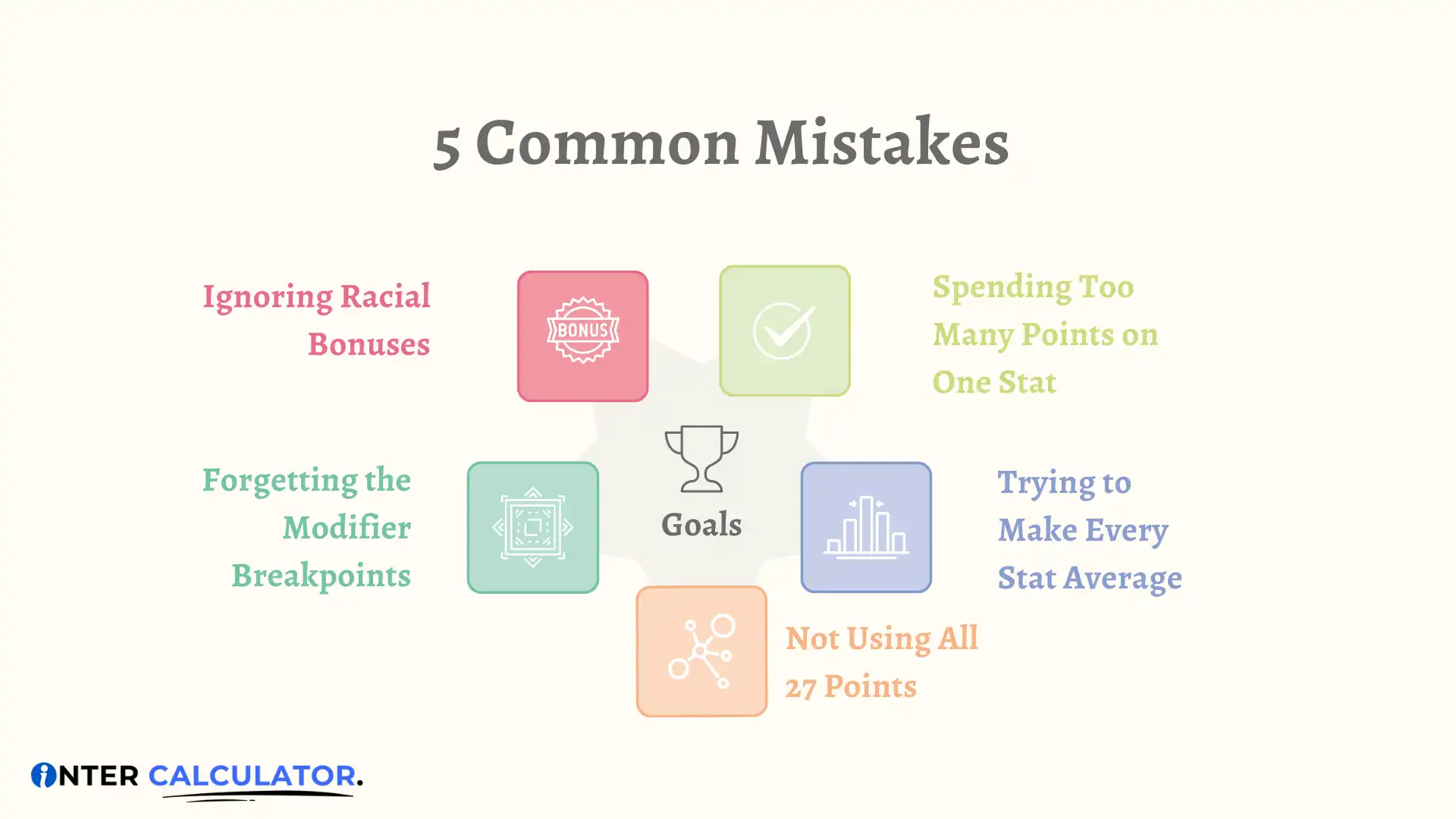Got questions? Our FAQs cover common topics about how our tools work, tips for accurate calculations, and guidance on using InterCalculator for everyday money decisions.
D&D 5e point buy calculator
☰ Menu
| Attribute | Ability Score | Racial Bonus | Total Score | Modifier | Cost |
|---|
Total Points Used: 0/27
Racial Traits
Select a race to view traits.
Adjust Point Costs
Default Point Buy Rules
- Available Points: 27
- Minimum Attribute Before Racial Bonus: 8
- Maximum Attribute Before Racial Bonus: 15
- Costs: 8=0, 9=1, 10=2, 11=3, 12=4, 13=5, 14=7, 15=9
Ask your DM if using non-standard races or house rules.
Note: This tool was last updated on 12-08-2025 to ensure accuracy and reliability.
 Ever feel stuck trying to build the “perfect” character in Dungeons & Dragons? It can be confusing to balance all those ability scores without going overboard. That’s exactly where a point buy calculator comes in handy. It’s a simple tool that helps you assign points wisely and build a strong character, without breaking the rules.
Whether you’re a new player or a seasoned DM, understanding how point buy works will give you way more control over your stats and your story. I’ll walk you through it in the easiest way possible, just like I do when helping my own group build their characters from scratch.
Ever feel stuck trying to build the “perfect” character in Dungeons & Dragons? It can be confusing to balance all those ability scores without going overboard. That’s exactly where a point buy calculator comes in handy. It’s a simple tool that helps you assign points wisely and build a strong character, without breaking the rules.
Whether you’re a new player or a seasoned DM, understanding how point buy works will give you way more control over your stats and your story. I’ll walk you through it in the easiest way possible, just like I do when helping my own group build their characters from scratch.
How to Use Our Point Buy Calculator (Step-by-Step)
Let’s make this easy. I’ll walk you through how to use our point buy calculator like you’re sitting right next to me at the table. It’s quick, simple, and you’ll see your character’s stats shape up in real time.- Choose a Race Start by picking a race from the dropdown list. The calculator will automatically add racial bonuses and traits based on your selection. No need to calculate those manually, it’s all handled for you.
- Set Ability Scores Next, adjust your six main stats: Strength, Dexterity, Constitution, Intelligence, Wisdom, and Charisma. You can type the numbers in directly or use the little arrows to fine-tune them.
- Check Your Points You get a total of 27 points to spend; that’s the standard rule in D&D 5e. As you build your stats, the calculator shows how many points you’ve used and how many are left.
- View Totals Instantly The table updates in real time. You’ll see each stat’s base score, racial bonus, total score, modifier, and how many points each one costs you.
- Reset Anytime Want to start over? Just click Reset, and it brings everything back to the default.
- Use Custom Rules (Optional) If your DM allows house rules, switch to the Custom Rules tab. You can change the total points available, set new min or max scores, or tweak how much each score costs. Click Apply Custom Rules to lock in your new setup.
- Rules Reference Tab Need a refresher? The Rules as Written tab gives you the official D&D 5e point buy chart, so you can quickly double-check how things work.
- Save Your Scores Click Save Scores to keep your build. It saves locally in your browser, so you won’t lose your setup if you come back later.
How the Point Buy System Works in D&D 5e
Building a balanced character in D&D 5e can feel like a puzzle, and the point buy system gives you all the pieces. Instead of rolling dice or using a preset stat line, you get 27 points to “buy” your ability scores one by one. It’s like shopping for the perfect build. Each score from 8 to 15 has a cost. The lower scores cost less, while higher ones take up more of your total points. For example:- An 8 costs 0 points
- A 13 costs 5 points
- A 15 costs 9 points
Official Point Buy Rules and Score Cost Table
If you’re using the standard D&D 5e rules, the point buy system gives you 27 points to spend across your six ability scores: Strength, Dexterity, Constitution, Intelligence, Wisdom, and Charisma. Here’s how it works:- Every ability starts at a base of 8
- You can increase each stat up to 15 using your 27 points
- Each increase has a point cost based on how high you go
| Ability Score | Point Cost |
| 8 | 0 |
| 9 | 1 |
| 10 | 2 |
| 11 | 3 |
| 12 | 4 |
| 13 | 5 |
| 14 | 7 |
| 15 | 9 |
How Do I Calculate DnD Ability Score Modifiers?
This part confused me when I first started playing D&D, but once you get it, it sticks forever. Your ability score modifier is the number that affects your dice rolls in the game. It’s used for attacks, skill checks, saving throws, and more. Here’s the simple rule: 👉 Take your ability score, subtract 10, then divide by 2 (and round down). Let me show you with a few examples:- A score of 10 or 11 gives you a modifier of +0
- A 14 gives you +2
- A 7 gives you –2
| Score | Modifier |
| 1 | –5 |
| 2–3 | –4 |
| 4–5 | –3 |
| 6–7 | –2 |
| 8–9 | –1 |
| 10–11 | 0 |
| 12–13 | 1 |
| 14–15 | 2 |
| 16–17 | 3 |
| 18–19 | 4 |
| 20–21 | 5 |
Base Scores vs Final Scores (With Racial Bonuses)
Here’s where things get interesting, and honestly, where I see a lot of new players get tripped up. In D&D 5e, the numbers you choose in point buy are your base scores. But once you pick a race, those numbers often go up, thanks to racial bonuses. Let me give you a simple example: Let’s say you assign 15 Dexterity using the point buy system. If you pick Elf, who gets +2 Dexterity, your final score becomes 17. You didn’t “buy” a 17; your race gave it to you. Here’s how the math works:| Stat | Base Score (Point Buy) | Racial Bonus | Final Score |
| Dexterity | 15 | +2 (Elf) | 17 |
| Constitution | 13 | +1 (Elf Variant) | 14 |
Point Buy vs Standard Array vs Rolling
There’s more than one way to set your stats in D&D 5e, and each method has its own vibe. Let’s break down the big three: Point Buy, Standard Array, and Rolling, so you can pick what fits your style (or your DM’s rules).Point Buy
You get 27 points to build your stats however you like (between 8 and 15). Every score costs points, and higher ones cost more.- Pros: Fair, flexible, great for balance
- Cons: Can feel “samey” if everyone min-maxes
Standard Array
Here’s the preset list of scores you assign in any order: 15, 14, 13, 12, 10, 8- Pros: Fast and easy, everyone’s on equal footing
- Cons: Less freedom to customize
Rolling (4d6 drop lowest)
You roll four six-sided dice for each stat, drop the lowest, and add the rest. According to data shared by the RPG community, this method gives you an average ability score of about 12.24, which is notably higher than standard array or point buy builds.- Pros: Can lead to powerful (or very weak) characters
- Cons: Risky, and often creates an imbalance between players
- Want control? Go with Point Buy
- Want simplicity? Try Standard Array
- Want chaos? Roll the dice and hope for the best!
5 Common Mistakes When Using Point Buy
Even though the point buy system is meant to keep things simple and fair, it’s easy to mess up if you’re not careful. I’ve made a few of these mistakes myself, especially when I first started creating characters. Let’s go over the most common slip-ups so you can avoid them:
Let’s go over the most common slip-ups so you can avoid them:
-
Spending Too Many Points on One Stat
-
Ignoring Racial Bonuses
-
Trying to Make Every Stat Average
-
Forgetting the Modifier Breakpoints
-
Not Using All 27 Points
Why We Built This Calculator
We built this point buy calculator because we’ve been in your shoes, flipping through books, doing math on paper, and second-guessing every stat decision. It slowed down our character creation, and honestly, it took some of the fun out of it. So we made something better. A tool that’s easy to use, clear to understand, and actually helpful, whether you’re brand new to D&D 5e or helping your entire party get set up before session one. I remember one time before a game night, my friend was stressing over how to balance his wizard’s Intelligence and Dexterity. We sat down with this tool, plugged in his ideas, and within minutes, he had a build he loved, no confusion, no wasted points. This calculator takes the guesswork out of point buy and puts you in control, with clean totals, automatic racial bonuses, and even custom rules if your DM likes to mix things up. It’s built by players, for players, to make character creation feel smooth, fair, and actually fun.Final Thoughts
Point buy isn’t just about numbers; it’s about giving you the freedom to shape your character exactly how you want. Whether you’re building a clever rogue, a sturdy fighter, or a charming bard, this system lets you plan with purpose and avoid the randomness of dice rolls. I’ve used point buy for most of my characters, and honestly, it’s helped me stay focused on who I want them to be, both in stats and in story. It might feel a bit technical at first, but once you get the hang of it, it becomes second nature. If you’ve got questions, thoughts, or want help building your next hero, drop them in the comments. I’d love to hear how you use point buy in your own games.Just like point buy helps you balance your character’s abilities, some tools help balance scores in other areas of life. For example, our AP Lang Calculator lets students estimate their exam scores quickly and easily.
FAQ – All Your Point Buy Questions Answered
Is it okay to put all 8s with point buy in 5e?
Nope, the point buy rules don’t let you leave points unspent. Even though 8 costs 0 points, you still need to use all 27 points somewhere. The system expects you to build a full character, not dump everything for fun (though it would be hilarious to roleplay!).Can a 27-point buy get to 16 in 5e?
Not directly. The highest you can buy is 15, and that costs 9 points. But some races give a +1 or +2 bonus, so your final score can hit 16 or even 17 after bonuses. That’s why understanding racial bonuses really helps during character creation.Can I lower a stat to gain extra points?
No, in 5e point buy, 8 is the minimum, and it costs zero. You can’t go lower than 8, and you can’t “sell” stats for more points. The floor is set to keep things balanced.Can two players have the exact same point buy build?
Yes, and it happens more often than you’d think, especially with popular class/race combos. That’s why using custom rules or mixing in flavor with your backstory helps make your character feel unique.What happens if I use custom rules?
If your DM allows custom point buy rules, you might get more than 27 points or different stat cost values. Some homebrew tables even allow scores to start at 6 or go up to 18. Just make sure everyone at the table agrees before building! Point buy is simple, but these little questions come up all the time, especially when you’re trying to min-max or try something weird. If you’re unsure, always check with your DM and use the calculator to avoid mistakes.Frequently Asked Questions
Created by Editorial Team
This calculator was created by the InterCalculator Editorial Team, led by Haris Farooq (Formula & Development). Our team specializes in formula research, calculator logic, and technical development, ensuring each tool is accurate, fast, and easy to use.
Accuracy Review Process:
Before publishing, every calculator goes through the InterCalculator Accuracy Review Process. For the D&D Point Buy Calculator, we verify formulas against official D&D 5e rules and player-tested standards. We test the calculator with a wide range of character builds, including unusual stat arrays and custom rule sets. All calculations are reviewed with an experienced tabletop gaming expert to confirm accuracy, clarity, and reliability.
